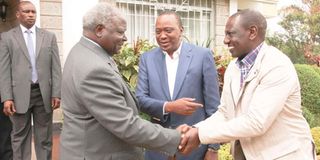Economy: Kibaki showed the way, Ruto is following suit

President Uhuru Kenyatta (center) and Deputy President William Ruto (right) with former President Mwai Kibaki during a past meeting.
What you need to know:
- In Parliament, Kibaki made his contribution eloquently with the oratory prowess that he was famous for.
- In his 10-year tenure as President, Kibaki was again instrumental in an economic flourish.
In mourning President Mwai Kibaki, Kenyans have been unanimous on his life, times and legacy: A man who served his country with diligent industry and made a remarkable difference in the lives of the people.
In Parliament, whether as a member of the Opposition or the Executive, Kibaki made his contribution eloquently with the oratory prowess that he was famous for. As a Cabinet minister, especially at the Ministry of Finance where he served between 1969 and 1982, he was able and effective. That era is still remembered as Kenya’s golden economic age.
In his 10-year tenure as President – 2002 to 2013 – Kibaki was again instrumental in an economic flourish reminiscent of his days at the Treasury. It is this success that the younger generations remember him for and why they were effusive in praising him last week.
Kenyans, therefore, expect their leader to champion economic issues that will improve their lot and make life bearable. They want a president under whom the labour of their hands and the sweat of their brow bring the bacon home to their families. Basic things, including food, education, housing and cheap sources of credit should be affordable to the majority of citizens.
President Kibaki is a household name for initiating policies that benefited the whole spectrum of the population: The poor, the middle class, small-scale businesses and large corporations. They include free primary education, subsidised secondary schooling, massive expansion of university learning, opening up the airwaves, mobile telephony and financial markets, and affordable credit.
In the 1992 United States election, Democratic presidential candidate Bill Clinton’s campaign was on the economy and popularised the mantra ‘the economy, stupid!’ He won that election and went on to be the American head of state for two terms of four years each. The US economy boomed under his administration.
Economic revival
In our place, United Democratic Alliance (UDA) presidential candidate William Ruto has placed economic and related issues at the forefront of his election campaign.
He has also been absolutely forthright that these matters would be the cornerstone of his administration if voters give him the mandate to preside over the affairs of Kenya in August.
The expected economic revival is based on four pillars. They are job creation, cheap credit to small-scale businesses, universal healthcare and national savings.
In Kenya, it has become the norm that tens of thousands of graduates complete college and university and have no expectation of a job, either in the formal or informal sector. This has led to despair that is partly the cause of the social problems the country increasingly continues to experience.
It is Deputy President Ruto’s conviction, and that of the alliance he is a part of, that this state of affairs must be remedied. It is his plan that his government would be deliberate in starting programmes and creating policies that would create millions of jobs, especially in agriculture, manufacturing and housing, for the young people who have the knowledge and the skills yet lack opportunities.
Affordable credit from the state, too, would be a shot in the arm for small and medium enterprises. They find it difficult to access credit from the formal financial sector and they have had to make do with informal setups, including shylocks and the sharks that mobile lenders have become.
Consequently, the businesses become stunted and eventually collapse.
Economic agenda
As a result, livelihoods are lost, unemployment soars, revenue collection dips and poverty levels keep rising. The time to save small businesses and boost them to even grow to become bigger is now. And cheap credit from the state is the answer.
If it is right for the government to fund and bail out parastatals, the same is true for small businesses. In any case, they are the goose that lays the golden egg in our country: They are the largest employers and hold the potential for more taxes.
The need for universal healthcare in Kenya cannot be gainsaid. Hospital bills torment a majority of citizens and, to cope, harambee is often the first option. But soon this is stretched to the limit and family jewels – land and cattle, among others – are offloaded.
It is a common saying these days that most families are one hospital bill away from extreme poverty.
A culture of national savings is equally important. DP Ruto has explained that the loans Kenya borrows from friendly nations are savings of the citizens of those countries. It would be well for Kenyans to save and also lend to their government.
This election campaign, the credit goes to Dr Ruto for championing the economic agenda. Without doing so, the Handshake duo would have thrust the country into the abyss of “constitutional moments”. Like in the Clinton campaign, it is ‘the economy, stupid’! in Kenya this time round.
Mr Buku works for the William Ruto presidential campaign [email protected]





